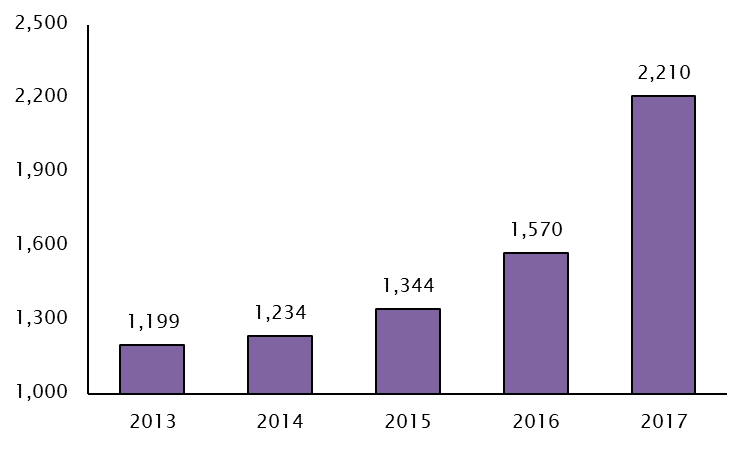
UK trade marks for spirits rise 41% in one year as popularity of artisan spirits surges
The number of trade marks registered for spirits and liqueurs in the UK has jumped 41% to 2,210 in 2017, up from 1,570 the previous year* as demand for artisan spirits grows.
Over the last five years, the number of trade marks registered for spirits has risen 84%, up from 1,199 in 2013.
RPC says the increase in trade marks is partly due to big drinks brands and supermarkets expanding their product lines by releasing their own brands of ‘artisan’ style spirits. Many are also increasingly experimenting with flavours and botanicals or launching ‘limited runs’ of products.
RPC adds that the rise in trade marks comes as more artisan gin distilleries have been launched over the last few years - 39 new distilleries were opened in the UK in 2017 alone**.
However, as the number of spirit brands in the UK increases, there are likely to be more trade mark disputes in this area. Recent high-profile examples of trade mark disputes relating to spirits include:
- Scottish craft beer company Brewdog issued a legal warning against a Birmingham pub to prevent it sharing its name with BrewDog’s gin brand, ‘Lone Wolf’ - this has since been withdrawn;
- Drinks giant Bacardi’s application to trade mark whiskey ‘Angel’s Envy’ was refused after absinthe manufacturer La Fee, who also have a product named ‘Envy’, objected to it;
- The Port of Leith Distillery (which has not yet opened) disputed Birmingham-based Gleann Mor Spirits’ trade mark registration of ‘Leith Gin’, but the opposition was rejected by the IPO
Ben Mark, Legal Director at RPC says: “Brands are rushing to register spirit trade marks as the industry goes through a period of rapid innovation.”
“Many drinks companies are adopting a strategy of launching multiple sub-brands and varieties of their drinks in order to meet consumer and retailers’ demands for “limited runs” and niche drinks. It is a big departure from 15 years ago when drinks companies would concentrate their marketing spend on just a few core brands and products.”
“More products inevitably means more trade marks.”
Ciara Cullen, Partner at RPC adds: “As a result, competition among spirits producers is getting increasingly intense.”
“As more businesses seek to establish and protect a strong brand identity amid a proliferation of launches of similar products, the chances of branding clashes and ‘copycat’ claims is high.”
Number of spirits and liqueurs trade marks jumped 41% in just a year as distillers experiment more with flavours and ingredients

*Trade mark class 33 - Wines, spirits and liqueur
**Source: UHY Hacker Young
